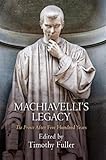Machiavelli's Legacy : "The Prince" After Five Hundred Years / ed. by Timothy Fuller.
Material type: TextPublisher: Philadelphia : University of Pennsylvania Press, [2016]Copyright date: ©2016Description: 1 online resource (200 p.)Content type:
TextPublisher: Philadelphia : University of Pennsylvania Press, [2016]Copyright date: ©2016Description: 1 online resource (200 p.)Content type: - 9780812292077
- 320.1 23
- JC143.M4 M3228 2016
- online - DeGruyter
| Item type | Current library | Call number | URL | Status | Notes | Barcode | |
|---|---|---|---|---|---|---|---|
 eBook
eBook
|
Biblioteca "Angelicum" Pont. Univ. S.Tommaso d'Aquino Nuvola online | online - DeGruyter (Browse shelf(Opens below)) | Online access | Not for loan (Accesso limitato) | Accesso per gli utenti autorizzati / Access for authorized users | (dgr)9780812292077 |
Browsing Biblioteca "Angelicum" Pont. Univ. S.Tommaso d'Aquino shelves, Shelving location: Nuvola online Close shelf browser (Hides shelf browser)

|

|

|

|

|

|

|
||
| online - DeGruyter Deterring Rational Fanatics / | online - DeGruyter The Pilgrim and the Bee : Reading Rituals and Book Culture in Early New England / | online - DeGruyter The Academic Job Search Handbook / | online - DeGruyter Machiavelli's Legacy : "The Prince" After Five Hundred Years / | online - DeGruyter Ideas of Chinese Gardens : Western Accounts, 1300-1860 / | online - DeGruyter Dino Compagni's Chronicle of Florence / | online - DeGruyter Standardizing Diversity : The Political Economy of Language Regimes / |
Frontmatter -- Contents -- Introduction -- Chapter 1. Machiavelli’s Enterprise -- Chapter 2. The Redeeming Prince -- Chapter 3. Machiavelli’s Revolution in Thought -- Chapter 4. Machiavelli’s Women -- Chapter 5. Machiavelli and the Business of Politics -- Chapter 6. Machiavelli and Machiavellianism -- Chapter 7. Machiavelli’s Prince: An Americanist’s Perspective -- Chapter 8. The Riddle of Cesare Borgia and the Legacy of Machiavelli’s Prince -- Notes -- List of Contributors -- Index -- Acknowledgments
restricted access online access with authorization star
http://purl.org/coar/access_right/c_16ec
Niccolo Machiavelli's The Prince is one of the most celebrated and notorious books in the history of Western political thought. It continues to influence discussions of war and peace, the nature of politics, and the relation of private ethics to public duties. Ostensibly a sixteenth-century manual of instruction on certain aspects of princely rule and behavior, The Prince anticipates and complicates modern political and philosophical questions. What is the right order of society? Can Western politics still be the model for progress toward peace and prosperity, or does our freedom to create our individual purposes and pursuits undermine our public responsibilities? Are the characteristics of our politics markedly different, for better or for worse, than the politics of earlier eras? Machiavelli argues that there is no ideal, transcendent order to which one can conform, and that the right order is merely the one that has the capacity to persist over time. The Prince's emphasis on the importance of an effective truth over any abstract ideal marks it as one of the first works of modern political philosophy.Machiavelli's Legacy situates Machiavelli in general and The Prince in particular at the birth of modernity. Joining the conversation with established Machiavelli scholars are political theorists, Americanists, and international relations scholars, ensuring a diversity of viewpoints and approaches. Each contributor elucidates different features of Machiavelli's thinking, from his rejection of classical antiquity and Christianity, to his proposed dissolution of natural roles and hierarchies among human beings. The essays cover topics such as Machiavelli's vision for a heaven-sent redemptive ruler of Italy, an argument that Machiavelli accomplished a profoundly democratic turn in political thought, and a tough-minded liberal critique of his realistic agenda for political life, resulting in a book that is, in effect, a spirited conversation about Machiavelli's legacy.Contributors: Thomas E. Cronin, David Hendrickson, Harvey Mansfield, Clifford Orwin, Arlene Saxonhouse, Maurizio Viroli, David Wootton, Catherine Zuckert
Mode of access: Internet via World Wide Web.
In English.
Description based on online resource; title from PDF title page (publisher's Web site, viewed 30. Aug 2021)


